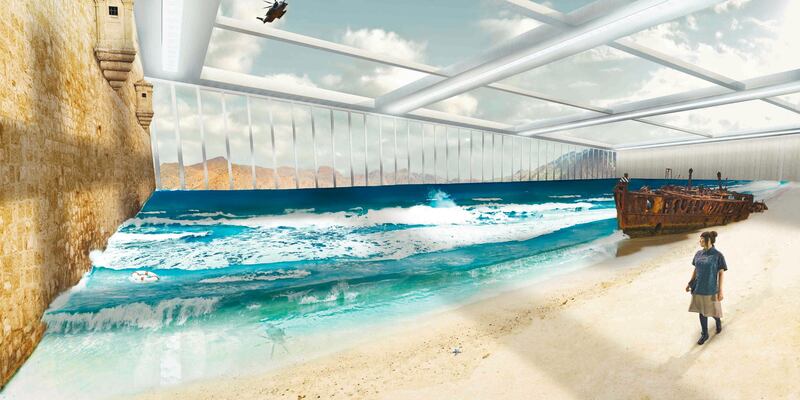Larissa Sansour is a Palestinian artist who explores the complexities of life in Palestine by drawing on pop culture and film in a cunning and often-humorous subversion of Western narratives.
Sansour's heavily political works are showing in a solo exhibition in Lawrie Shabibi Gallery in Alserkal Avenue and here we catch up with her for a quick Q&A:
Q: Your work is clever, often humorous and fiercely political. Given the status of Palestinians, do you think it is impossible to avoid politics in any form of art?
A: Separating art from politics is an impossible task. The two are intricately linked, and an autonomous piece of work that is not conditioned by its context is virtually unimaginable. That said, some artists are obviously more directly or overtly politically engaged than others, and if they need to be labelled “political artists” for easier categorisation, I don’t see a big problem with that.
As so many other artists, not just from the Middle East, I do recognise the urgency to reference worldwide politics, and I do feel that art is a potent tool in affecting political change provided that it operates on its own terms and is not taken out of the artistic discourse.
Q: You have had your fair share of criticism for the overtly political nature of your work, notably the revoked Musée de l’Elysée prize - have you ever thought of changing your work because of that?
A: It is becoming more and more common to see corporations get involved in the arts, especially in the wake of all the financial cuts in public art funds in recent years. With these sponsorships comes the risk of companies overstepping the line and attempting to influence the sponsored work because it does not match their profile. In most cases, the reasons for attempting to censor certain works are probably non-political. There could be any number of reasons why a sponsor would have a problem being associated with a specific artwork.
But if the very idea of corporate involvement in the arts is to work, it is crucial to keep in mind that art prizes are not advertising campaigns. As soon as a sponsor blocks, censors or attempts to limit the artistic freedom, the system has failed.
The Lacoste episode is indeed an unfortunate one, but nonetheless, I am not opposed to the idea of corporate sponsorship per se. As long as the rules of the game are respected, financial support from corporations is a valuable asset to artistic production.
Q: Do you feel that art can do more than political agendas to bring about real change?
A: If art could not bring about real change, you would not see as many cases of censorship and imprisonment of artists. Look at Ai Wei Wei, for example. Look at how many Palestinian exhibitions worldwide have been protested or closed down. But at the same time, artists should not be confused with political spokespeople, There is a big difference between creating an artwork that comments and promoting a specific political agenda.
Personally, I find it uncomfortable to be put in the position of a political spokesperson outside of the artistic context. Political art has its own impact on the political dialogue, and prefer to comment by way of my work rather than step outside of the artistic realm and promote existing political agendas.
For me, the Lacoste Elysée Prize incident is a clear example of how instrumental a work of art can be, even when it functions according to its own logic. Lacoste deemed my work dangerous enough to censor, and in a fortunate turn of events they achieved the exact opposite. The work has not only gained significant exposure in the art world, but also in mainstream newspapers and social media like Facebook and Twitter. It is overwhelming to see how people from different backgrounds related with such commitment to a work of art and an attempt to silence it.
Q: How do you feel about having your first solo show in Dubai?
A: I am very excited about my show in Dubai. Many of the people who supported me throughout the Lacoste crisis and helped me see the completion of my film with funding have are from the UAE, so I am very eager to finally show my work in Dubai and get people’s feedback.
Q: What is your opinion of the UAE's art scene - how does it compare to London or Copenhagen?
A: I have only visited the UAE a few times and have yet to gain a full understanding of the art scene, but from my experiences so far it is a rich and vibrant scene that I am looking forward to exploring more.
Q: Do you feel more connected to the audiences here as they are Middle Eastern compared to the ones in Europe?
A: I think there is a big difference between one Middle Eastern country to another, so it is hard to cover this question in general terms. I am always very interested to hear reactions to my work from all over the world. Since I have exhibited in Europe a lot, I somehow know what to expect in terms of feedback, so I am very keen to see how my recent work will function in Dubai.
* Larissa Sansour: Science Faction runs until November 12 at Lawrie Shabibi Gallery, Alserkal Avenue.





